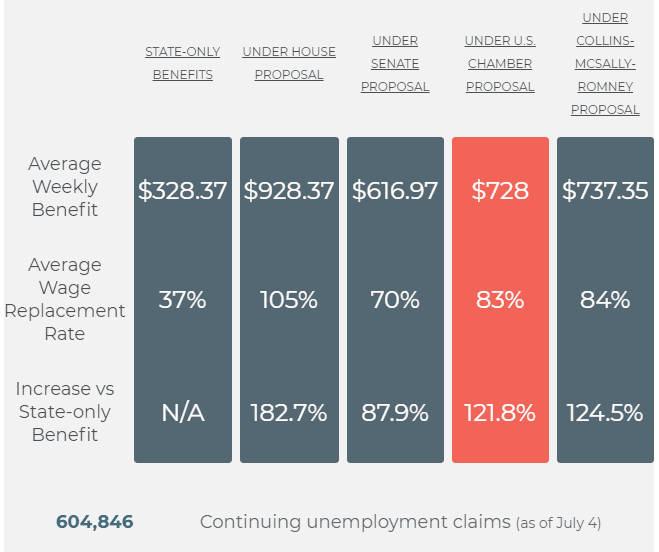FEMA Approves Application to Provide an Additional $300 Per Week to Unemployed Michiganders
August 21, 2020Earlier this month, President Trump issued an Executive Order that extended unemployment benefits of up to $400 per week. The President’s actions were in response to the inability of Congress to agree upon a solution of the expiration of the additional $600 weekly unemployment benefit, an element of the earlier CARES legislation, that expired at the end of July.
Under the Executive Order, while states could provide eligible unemployed persons up to $400 supplemental dollars weekly, $100 would have to come from the state itself. Michigan, like most other states, are not in a position to provide the additional $100 weekly sum (which would cost the State roughly $1 billion monthly), so Michigan applied for and received approval for the additional $300 per week in FEMA funds.
Once the State receives these funds, the $300 weekly supplemental unemployment support will apply retroactively to eligible persons on unemployment insurance to the beginning of August and will also apply prospectively until the FEMA funds are depleted.
Given that the nation is currently in disaster season (e.g. Gulf Coast hurricanes, West Coast fires), the FEMA funds redirected to supplemental unemployment benefits are not expected to last much into the month of September. Additionally, it is highly likely the Congress will need to act to approve new funds to replenish FEMA disaster response capability.
While the President actions are only a temporary partial solution, this action will benefit the 900,000-plus Michiganders on unemployment. The Chamber continues to urge the Congress to agree on compromise legislation that addresses the supplemental unemployment issue, extension of the Paycheck Protection Program, aid to state, local and school jurisdictions, and address needed business liability projections.
Read more about the Chamber’s priorities for the next round of stimulus funding.
FAQ: Breaking Down the Information
Where do the FEMA Funds Come From?
The President is making available existing FEMA disaster response funds to fund this unemployment assistance through a recent Executive Order. These funds are previously approved and budgeted dollars to respond to FEMA declared emergency situations. This FEMA fund will likely need to be replenished by the Congress in order for the Federal Government to have the resources needed to respond to natural disasters such as hurricane response.
If the President’s Executive Order is up to $400 weekly, why is Michigan only asking for $300?
The President is providing two options for states to access these supplemental Unemployment Insurance (UI) funds:
- A) $400 ($300 from Federal funds, with $100 to be provided by the state)
- B) A 50/50 match: Federal funds put up $1 for every $1 the state puts toward unemployment insurance.
Michigan is going with option B — $300 in federal kicker to be matched by existing state UI payments. Now that Michigan’s plan is approved, it is expected that the funds can be retroactively applied to the time when the $600 initial unemployment funding expired. To qualify, you have to be receiving at least $100 in current unemployment. People on Work Share plans will be eligible for an additional weekly benefit based on the amount they are currently receiving.
Michigan, like most other states, is not in a position to afford an additional $100 weekly per unemployed person. That would cost about $1 billion monthly – funds Michigan simply does not have.
What is the duration of the FEMA Funds?
The duration of this funding availability is based on when the FEMA disaster fund drops to a balance of $25 billion and is likely only to last 3 to 5 weeks.
Will there be more steps for workers on unemployment to take to receive the funds?
As these are FEMA funds, and not Department of Labor (DOL) funds, the State of Michigan will likely need to create new rules and questions for UIA recipients to answer. This information is to be determined
Federal Unemployment Assistance Proposals: Michigan Impact Comparison
When the U.S. Senate returns from recess in September, the negotiations of the next round of stimulus will continue. Prior to the break, discussions were at a standstill with the following proposals on the table.
- House Democrats have proposed renewing a flat $600/week federal supplement.
- Senate Republicans introduced a plan to target 70% wage replacement, with a cap on the weekly federal supplement of $500.
- The U.S. Chamber has recommended a similarly structured plan, with target replacement between 80% and 90% of an individual’s working wages (85% is used for the analysis below) and a supplement cap of $400.
- Under the Senate and Chamber proposals, if a state cannot conduct the individual calculations, each recipient will receive a flat $200 supplement.
Michigan Benefits Broken Down Under Each Proposal

